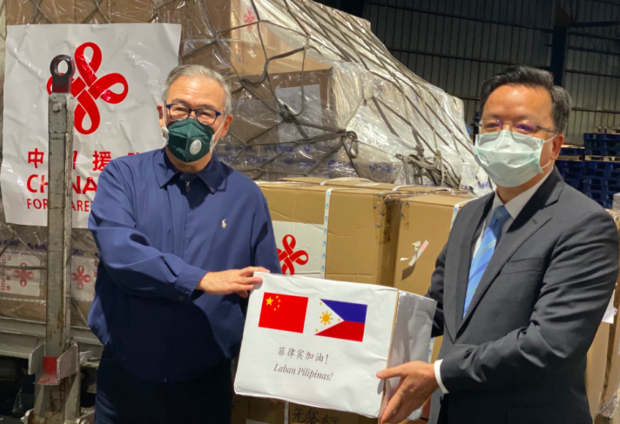
Foreign Secretary Teodoro Locsin Jr. received from China Ambassador to the Philippines Huang Xilian the donation from the Chinese government of 100,000 test kits, 100,000 surgical masks, 10,000 N95 masks, and 10,000 sets of personal protective equipment last March 21.
MANILA, Philippines — The Chinese Embassy in Manila on Sunday denied that the test kits that supposedly had low accuracy or yield inaccurate results came from donations made by the Chinese government.
In a statement, the embassy further refuted the Department of Health’s “irresponsible remarks” claiming that some of the test kits, which formed part of the Chinese donation to the Philippines last March 21, were not used because it only showed 40-percent inaccuracy.
“The test kits mentioned by the DOH official on 28 March 2020 during the press briefing were neither tested by RITM (Research Institute for Topical Medicine) which did not receive any kit sample for lab validation, nor donated by the Chinese government,” the embassy said.
“The Chinese Embassy firmly rejects any irresponsible remarks and any attempts to undermine our cooperation in this regard,” it added.
Citing clarification made by the DOH, the embassy said the test kits donated by the Chinese government were “of high quality.”
“According to the clarification of the DOH, the two batches of 2,000 BGI PCR-type test kits and 100,000 Sansure PCR-type test kits donated by the Chinese government have been assessed by the Research Institute for Tropical Medicine (RITM) to be at par with World Health Organization-provided kits, and those test kits are of high quality and standards and have no accuracy problems, which are being used in Philippine test laboratories and have helped accelerate the testing process,” it said.
Health Secretary Francisco Duque III assured there is “nothing wrong” with the test kits donated by the Chinese government.
“Hi! There is nothing wrong with the Real Time-Polymerase Chain Reaction machine which is used for generating positive or negative result as the case may be,” Duque said in a text message released by the embassy.
Duque added that the test kits were “very good” and at par with the standards of WHO and approved by the RITM.
The DOH earlier said the test kits from China were simultaneously used with the ones for the World Health Organization (WHO) to ensure the former passes the standards of the latter.
The health department further said it authorized the use of Sansure test kits since it had the same results with those of WHO’s.
Meanwhile, an increase in the number of cases could be expected as the various subnational laboratories begin their operations, DOH said.
The subnational laboratories are San Lazaro Hospital, Baguio General Hospital, Vicente Sotto Memorial Medical Center and the Southern Philippines Medical Center.
To date, there are 1,075 confirmed COVID-19 cases in the country, of which 68 have already died.

